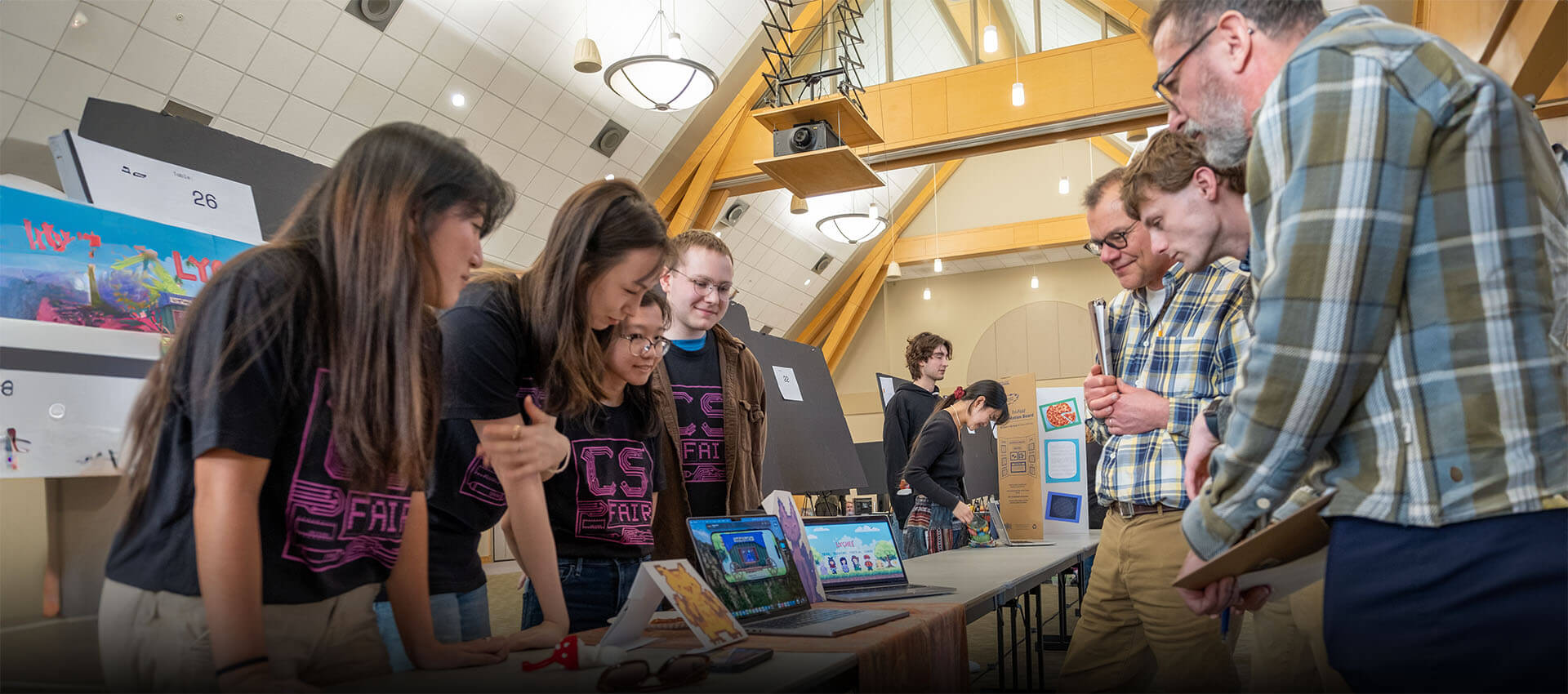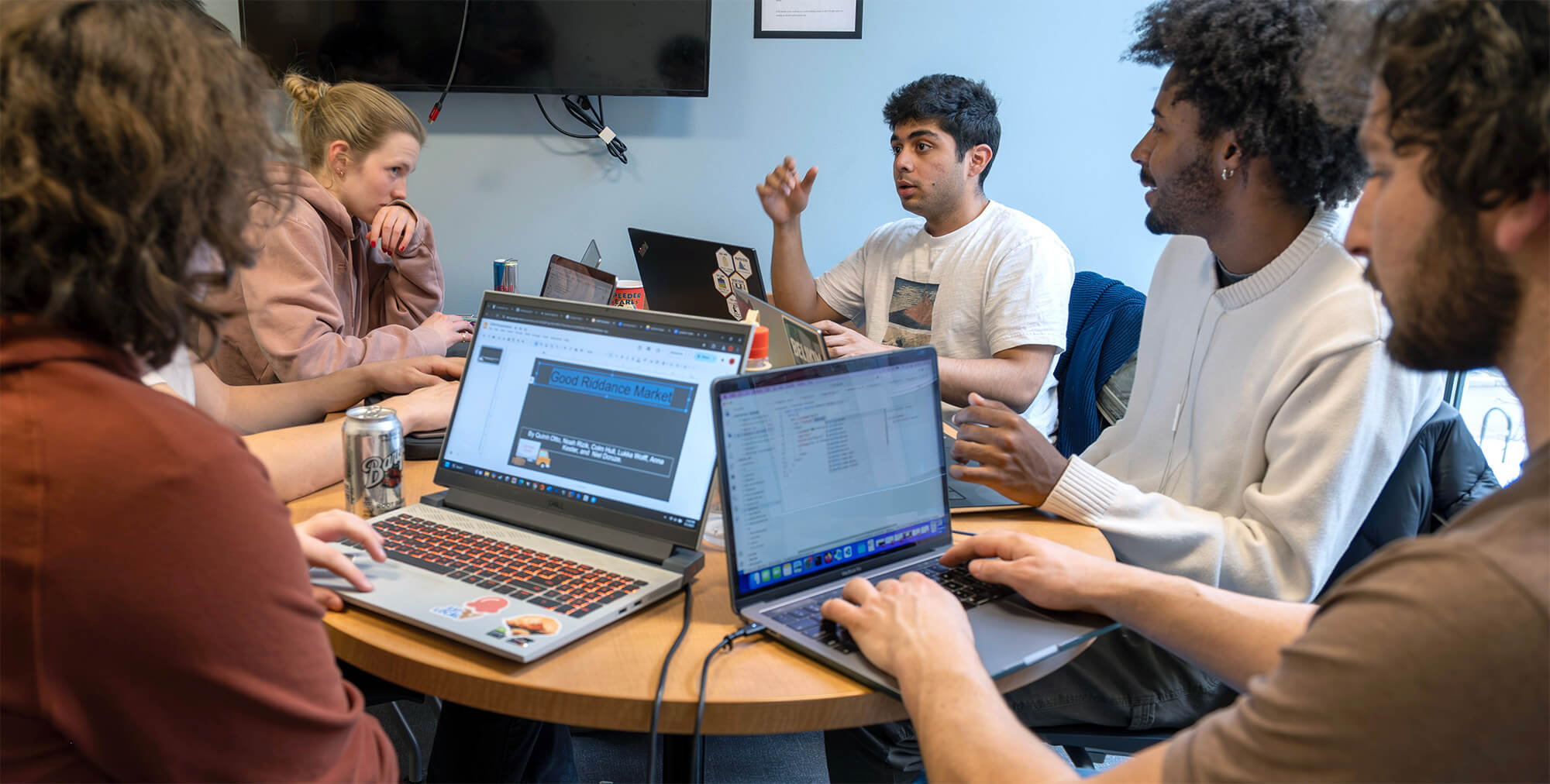Curriculum
A student's doctoral program consists of four stages:
- gaining a sound basis in computer science, primarily through coursework
- gaining appropriate depth and breadth in a research area
- choosing an appropriate research problem
- completing the thesis research and documenting that research in a dissertation
Four hurdles mark the completion of these stages:
- the oral comprehensive exam demonstrates the breadth of knowledge in computer science
- the written comprehensive exam demonstrates the research-readiness
- the thesis proposal describes the chosen research problem
- the dissertation and oral thesis defense conclude the thesis research
Credit Hours and Course Requirements
Credit requirements for the Ph.D. are listed here in the Graduate Catalogue
All coursework must be done in 200 or above level courses with the exception that a student may apply two 100-level (excluding 100-level CS courses), three-credit courses towards their graduate programs (with the pre-approval of the Graduate College). Note all coursework must be approved by the student's Studies Committee and the Graduate Committee.
The courses a student uses towards the degree must be approved by his/her studies committee.
Minimum Residence Requirements
Candidates for the doctoral degree must satisfactorily complete a minimum of 51 hours in residence. The residency requirement is completed by courses that (1) are taken for graduate credit through the University of Vermont either in the academic year or summer on the main campus or at off-campus locations, and (2) are taken after the student has been admitted to the Graduate College.
Comprehensive Exams
Each student must pass the comprehensive exams before graduating. Details can be found in the Graduate Catalogue. Under no circumstances will more than two attempts at the comprehensive exams be allowed.
Each student planning to take the oral part of a comprehensive exam should consult with the Studies Committee to determine the topical areas and examiners and then inform the Graduate Committee of the decision. The student also needs to schedule an examination date with the examiners and inform the Graduate Committee. It is strongly recommended that the examination is completed during the academic year unless all examiners agree to give the exam on a date during the break. Details can be found in the Ph.D. Comprehensive Oral Examination Policy. Each student can ask the examiner to provide a study topic list for each topical area.
Thesis Proposal
Once the student has mastered the basic material in a research area and chosen a thesis topic, they must present that topic to the studies committee and the larger Computer Science community. Each student must present a written thesis proposal to the studies committee a minimum of two weeks prior to the thesis proposal. The thesis proposal itself is a public presentation of the student's thesis topic. An abstract of the proposal will be announced to the Computer Science community a minimum of seven days prior to the thesis proposal and will be clearly advertised to the community. Although the thesis topic is by nature a work in progress at this stage, the student should be able to clearly identify and communicate:
- The idea being explored
- Why the idea is important
- How the student can complete the research
- Why the idea is novel
- What related work exists
Oral Exam
Following the public thesis proposal, the studies committee will hold a closed oral area examination of the student. The student must demonstrate sufficient breadth and depth of understanding of the research area to satisfy the members of the studies committee. For both the thesis proposal and the oral exam, the student's studies committee may:
- Pass the student
- Pass with additional work required
- Fail the student
Any additional work required by the studies committee must be completed before the student defends the thesis. This work is assigned to cover deficiencies in either the thesis {C}theme or the student's mastery of a surrounding research area. A student failing either the thesis proposal or the oral exam may petition the Graduate Committee for permission to attempt the proposal and oral exam again. Students in this position should be sure to have detailed discussions with their studies committee to understand why they failed in the previous attempt.
Candidacy
A student successfully completing the course requirements, the comprehensive examinations, the thesis proposal, and the oral exam will advance to candidacy for the Ph.D. degree.
Thesis Defense and Thesis Committee
In addition to the above candidacy requirements, a Ph.D. student needs to complete at least 30 credit hours of doctoral dissertation research and should have at least two papers before their thesis defense, one of which has been accepted in a peer-reviewed venue and another which has either been accepted or is under invited revision in a peer-reviewed venue; these two papers must not be a conference version and a journal version of the same topic. The Ph.D. defense must be organized publicly before their thesis committee (also called Dissertation Defense Examination Committee). The thesis committee must include at least four members and must be approved by the Graduate Committee and the Dean of the Graduate College. This thesis committee must include at least one member from outside the department who will serve as the chair of the thesis committee.
The thesis defense presentation is open to the public. It must be advertised widely via email and public postings. The end of the thesis defense is closed; during this portion, the thesis committee may ask any questions of the student. Students must submit a written thesis to the Graduate College for a format check a minimum of three weeks before their defense. Students must provide copies of the written dissertation to each member of the thesis committee a minimum of two weeks before the defense.
After considering the written dissertation, the public presentation of the thesis and the student's answers to the questions, the thesis committee may:
- Pass the student without revisions
- Pass the student with minor revisions
- Pass the student with major revisions
- fail the student
The student must submit minor revisions for approval to his or her advisor. The student must submit major revisions to the entire committee for approval. Students failing their defense may petition the Graduate Committee for an additional attempt. If the Graduate Committee denies the petition, the student is dismissed from the program.
Other Requirements
To remain in good standing, students must continue to make reasonable progress towards completing their degree requirements. To measure this progress, the following requirements are placed on all Ph.D. students:
- Time limit. All full-time students (taking at least 15 credits/year) must successfully pass their comprehensive exams within 3 years of enrollment (not counting the time while on provisional status). All part-time students must successfully pass their comprehensive exams within 5 years of enrollment (again not counting the time while on provisional status). Extensions may be awarded for extraordinary extenuating circumstances, at the discretion of the Graduate Committee. The Department expects all full-time students to complete their degree within 6 years of enrollment, and part-time students to complete their degree with 8 years of enrollment.
- Individual course grade. A student may be dismissed from the Graduate College if two grades or more below a B (3.00) or the designation of "U" in Thesis or Dissertation Research or Seminar are received. For more information, see UVM's Enrollment Policies and Procedures for Graduate Students.
- Accumulative grade point average (GPA). Every Ph.D. student must maintain a GPA of 3.00 (B) at all times in the courses taken at the University of Vermont. Any students falling below a 3.00 will be placed on academic probation and their progress will be reviewed by the Graduate Committee, with the possible imposition of sanctions.
A Ph.D. in Computer Science implies more skills than simply the ability to perform research in computer science. Thus the program requires students to gain acceptable experience in teaching, programming, and the communication of technical ideas.
Teaching. All doctoral students must gain acceptable experience in teaching. Taking into consideration the student's expressed long-term career interests, the student's Studies Committee will define a role the student must take in assisting the Department in teaching its courses. These responsibilities may range from being a grader for multiple courses to being the primary instructor for a single course.
Programming. The Studies Committee must also define a mechanism for the student to demonstrate competence in programming. For most students, this competence will be demonstrated by successful completion of a course that includes a significant programming component. Courses that satisfy this requirement may be approved by the Graduate Committee. The studies committee may alternatively certify the student as having satisfied this requirement (with the approval of the Graduate Committee) based on other criteria, including:
- Past experience
- A programming project
- A programming component to the thesis research
Communication. Research is of little use if it is not communicated to others. Furthermore, a doctoral student's reputation is largely based on his or her writing and presentation. All doctoral students should be able to communicate original technical ideas orally and in writing. Although significant differences exist between oral and written presentations, the basic organizational skills and efforts are similar. All communication must make several points clearly:
- What is the research idea?
- What is its contribution?
- Why is it different from previous work?
Refereed publications and conference presentations are good evidence to meet speaking and writing requirements for the student. The advisor will be responsible for certifying with evidence that the student has gained sufficient proficiency in speaking and writing.
Sample Programs of Courses
The curricular requirements of our Ph.D. program are flexible enough to accommodate students with varying backgrounds and interdisciplinary interests. Students will work closely with their graduate Studies Committee to design curricula that are commensurate with their backgrounds and interests.
View our sample Ph.D. programs
Courses and Offering Frequencies
The Department offers 200-level courses, which are taken both by advanced undergraduate students and graduate students. Students taking 200-level courses for graduate credit typically need to do additional work, frequently a project or class presentation. The Department also offers 300-level courses, which are open only to graduate students.
For the description of each course and its offering frequency in the past, see our official course listing. Note that course offering frequencies often change due to enrollment demands. Talk to your advisor for more details.
Computer Science Graduate Program Course Listing


